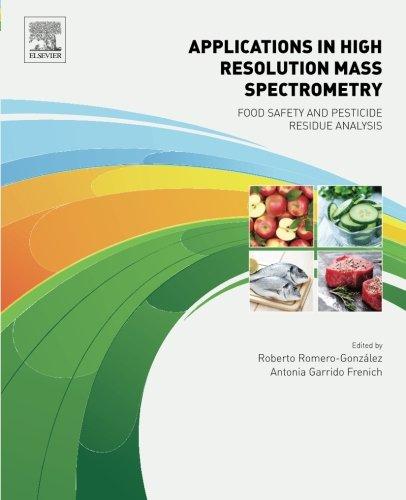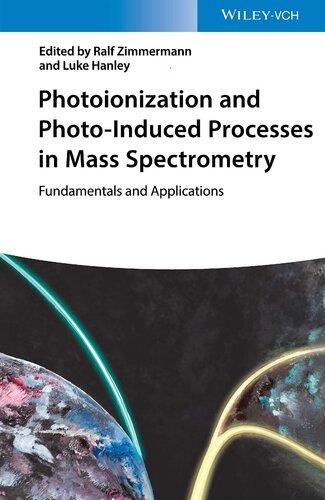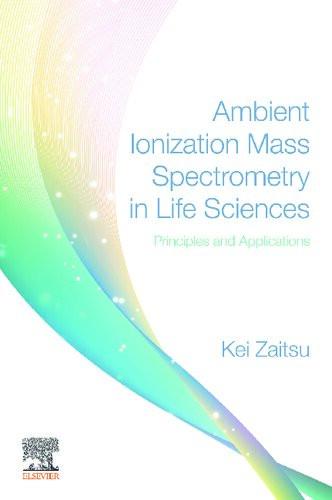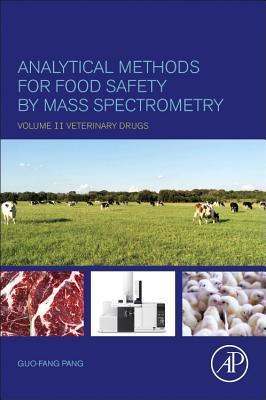HYPHENATIONSOF
CAPILLARYCHROMATOGRAPHY WITHMASSSPECTROMETRY
Editedby
PETERQ.TRANCHIDA
LUIGIMONDELLO
Elsevier
Radarweg29,POBox211,1000AEAmsterdam,Netherlands TheBoulevard,LangfordLane,Kidlington,OxfordOX51GB,UnitedKingdom 50HampshireStreet,5thFloor,Cambridge,MA02139,UnitedStates
Copyright © 2020ElsevierInc.Allrightsreserved.
Nopartofthispublicationmaybereproducedortransmittedinanyformorbyany means,electronicormechanical,includingphotocopying,recording,orany informationstorageandretrievalsystem,withoutpermissioninwritingfromthe publisher.Detailsonhowtoseekpermission,furtherinformationaboutthe Publisher’spermissionspoliciesandourarrangementswithorganizationssuchasthe CopyrightClearanceCenterandtheCopyrightLicensingAgency,canbefoundatour website: www.elsevier.com/permissions .
Thisbookandtheindividualcontributionscontainedinitareprotectedunder copyrightbythePublisher(otherthanasmaybenotedherein).
Notices
Knowledgeandbestpracticeinthis fieldareconstantlychanging.Asnewresearch andexperiencebroadenourunderstanding,changesinresearchmethods,professional practices,ormedicaltreatmentmaybecomenecessary.
Practitionersandresearchersmustalwaysrelyontheirownexperienceandknowledge inevaluatingandusinganyinformation,methods,compounds,orexperiments describedherein.Inusingsuchinformationormethodstheyshouldbemindfulof theirownsafetyandthesafetyofothers,includingpartiesforwhomtheyhavea professionalresponsibility.
Tothefullestextentofthelaw,neitherthePublishernortheauthors,contributors,or editors,assumeanyliabilityforanyinjuryand/ordamagetopersonsorpropertyasa matterofproductsliability,negligenceorotherwise,orfromanyuseoroperationof anymethods,products,instructions,orideascontainedinthematerialherein.
LibraryofCongressCataloging-in-PublicationData
AcatalogrecordforthisbookisavailablefromtheLibraryofCongress
BritishLibraryCataloguing-in-PublicationData
AcataloguerecordforthisbookisavailablefromtheBritishLibrary
ISBN:978-0-12-809638-3
ForinformationonallElsevierpublicationsvisitourwebsiteat https://www.elsevier.com/books-and-journals
Publisher: SusanDennis
AcquisitionEditor: KathrynEryilmaz
EditorialProjectManager: SaraPianavilla
ProductionProjectManager: PremKumarKaliamoorthi
CoverDesigner: ChristianBilbow
TypesetbyTNQTechnologies
Contributors
PaolaArena
DepartmentofChemical,Biological,PharmaceuticalandEnvironmentalSciences, UniversityofMessina,Messina,Italy
HenrietteEngenBerg
DepartmentofChemistry,UniversityofOslo,Oslo,Norway
FrancescoCacciola
DepartmentofBiomedical,Dental,MorphologicalandFunctionalImagingSciences, UniversityofMessina,Messina,Italy
GiovanniD’Orazio
IstitutoperiSistemiBiologici,ConsiglioNazionaledelleRicerche,Monterotondo,Italy
FrankDavid
ResearchInstituteforChromatography,Kortrijk,Belgium
ChrisG.deKoster
SwammerdamInstituteforLifeSciences,Amsterdam,theNetherlands
PaolaDonato
DepartmentofBiomedical,Dental,MorphologicalandFunctionalImagingSciences, UniversityofMessina,Messina,Italy
PaolaDugo
DepartmentofChemical,Biological,PharmaceuticalandEnvironmentalSciences, UniversityofMessina,Messina,Italy;UnitofFoodScienceandNutrition,Department ofMedicine,UniversityCampusBio-MedicoofRome,Rome,Italy;Chromaleonts.r.l., c/oDepartmentofChemical,Biological,PharmaceuticalandEnvironmentalSciences, UniversityofMessina,Messina,Italy
ChiaraFanali
CentroIntegratodiRicerca,CampusBio-MedicoUniversity,Roma,Italy
SalvatoreFanali
IstitutoperiSistemiBiologici,ConsiglioNazionaledelleRicerche,Monterotondo,Italy; TeachingCommitteeofPh.D.SchoolinNaturalScienceandEngineering,Universityof Verona,Verona,Italy
Hans-GerdJanssen
UniversityofAmsterdam,Van ‘tHoffInstituteforMolecularSciences,Analytical Chemistry-Group,Amsterdam,theNetherlands;UnileverResearchandDevelopment, Vlaardingen,theNetherlands
ArendH.J.Kolk
UniversityofAmsterdam,Van ‘tHoffInstituteforMolecularSciences,Analytical Chemistry-Group,Amsterdam,theNetherlands
ElsaLundanes
DepartmentofChemistry,UniversityofOslo,Oslo,Norway
DomenicaMangraviti
DepartmentofChemical,Biological,PharmaceuticalandEnvironmentalSciences, UniversityofMessina,Messina,Italy
LuigiMondello
DepartmentofChemical,Biological,PharmaceuticalandEnvironmentalSciences, UniversityofMessina,Messina,Italy;Chromaleonts.r.l.,c/oDepartmentofChemical, Biological,PharmaceuticalandEnvironmentalSciences,UniversityofMessina,Messina, Italy;UnitofFoodScienceandNutrition,DepartmentofMedicine,UniversityCampus Bio-MedicoofRome,Rome,Italy;BeSeps.r.l.,c/oDepartmentofChemical,Biological, PharmaceuticalandEnvironmentalSciences,UniversityofMessina,Messina,Italy
MartaP.B.Mourão
UniversityofAmsterdam,Van ‘tHoffInstituteforMolecularSciences,Analytical Chemistry-Group,Amsterdam,theNetherlands
DavidK.Pinkerton
DepartmentofChemistry,UniversityofWashington,Seattle,WA,UnitedStates
SarahE.Prebihalo
DepartmentofChemistry,UniversityofWashington,Seattle,WA,UnitedStates
GiorgiaPurcaro
GemblouxAgro-BioTech,UniversityofLiège,Gembloux,Belgium
BrookeC.Reaser DepartmentofChemistry,UniversityofWashington,Seattle,WA,UnitedStates
HanneRoberg-Larsen
DepartmentofChemistry,UniversityofOslo,Oslo,Norway
PeterJ.Schoenmakers
Van ‘tHoffInstituteforMolecularSciences,UniversityofAmsterdam,Amsterdam, theNetherlands
KristenJ.Skogerboe DepartmentofChemistry,SeattleUniversity,Seattle,WA,UnitedStates
RobertE.Synovec DepartmentofChemistry,UniversityofWashington,Seattle,WA,UnitedStates
PeterQ.Tranchida DepartmentofChemical,Biological,PharmaceuticalandEnvironmentalSciences, UniversityofMessina,Messina,Italy
NathanialE.Watson DepartmentofChemistry,UniversityofWashington,Seattle,WA,UnitedStates
StevenRayWilson
DepartmentofChemistry,UniversityofOslo,Oslo,Norway
MariosimoneZoccali
DepartmentofChemical,Biological,PharmaceuticalandEnvironmentalSciences, UniversityofMessina,Messina,Italy
Preface
Thepresentbook,composedof fivechapters,providesup-to-dateand detailedinformationonthehyphenatedtechnique,capillary chromatography-massspectrometry(CC-MS),initswidevarietyof combinations.Oneofthemainobjectivesofthecontributionistogivethe ReadersufficientinformationtopinpointthemostappropriateCC-MS approachforher/hisanalyticalnecessity,whateveritmaybe.Hopefully, thebookwillalsocontributeinmovingtheviewofthosewhooperatein the fieldofCC-MSandwho:(I)consider,amongchromatographers,the massspectrometeronlyasaspectra-generatingdetector;(II)devote,among massspectrometrists,littleattentiontothechromatographyprocess.
TheheterogeneityofCC-MStechnologiesderivesfromthecurrently availabletypesofchromatographic(gaschromatography GC,liquid chromatography LC,capillaryelectrophoresis CE,etc.)andmass analyzing(singlequadrupole Q,time-of-flight ToF,etc.)systems.Both chromatographyandmassspectrometrycanexistasstandalonetechnologies,andprovidecomplementaryanalyteinformation,whichareideallya retentiontime,amassspectral fingerprint,andthemolecularweight (comprisedinthemassspectra);hence,CC-MSisatwo-dimensional(2D) methodology,withitsanalyticalpotentialdependingtoagreatextenton theMScapabilities(e.g.,lowresolution vs. highresolution,single- vs. dualstageMS).
Two(sometimesmore)separationstepscanbecombinedinamultidimensionalcapillarychromatographyconfiguration(MDCC-MS:e.g., MDGC-ToFMS,MDLC-QMS,etc.),greatlyincreasingtheprobabilityof subjectingtotallyresolvedcompoundstomassspectrometry,thusreducing the “workload” ofthelastanalyticaldimension.Multidimensionalcapillary chromatography,whichisenabledbyusingdedicatedtransferdevices,can beclassifiedintotwogreatgroups:(I)heart-cutting,meaningthatonlya specificnumberof first-dimensioneffluentbandsaretransferredtothe secondcolumn(e.g.,CE-CE,GC-GC);(II)comprehensive,meaningthat theentiresampleisanalyzedonthetwoanalyticalcolumns(e.g.,LC LC, GC GC).SimilartotheconceptofMDCC,massanalyzerscanbe combinedinsequence(CC-MS-MS:e.g.,LC-Q-ToF,GC-triplequadrupoleMS,etc.),greatlyenhancinganalyticalspecificity,thusreducingin manycasestheneedforhigh-resolutionchromatography.Inbothinstances,
eitherMDCC-MSorCC-MS-MS,theanalyticaldimensionsbecomeat leastthree.
Theuseofmultidimensionalapproaches,atboththecapillarychromatographyandmassspectrometrylevels,generatesfourorevenmore analyticaldimensions(e.g.,LC-GC GC-MS-MS).Forsuchpowerful instrumentation,oneofthemaindifficultiesisrelatedtotheselectionofa sufficientlycomplexsample!
AttheendofanyCC-MSprocess,whatevernumberofdimensions,a greatdealofinformationisgenerated,withdifferentdegreesofusefulness. Furthermore,theusefulinformationmustbe,inmanyinstances,isolated fromtheuselessinformation.Sucheventscallforthedevelopmentof suitabledatamanagementandinterpretationstrategies.
Thetopicscontainedinthepresentbookareallconfinedwithinthe conceptsreportedintheaboveparagraphs:
Chapter1 isdedicatedtoconventionalandhigh-speedGC-MS,andis dividedintothreesub-chapters:insub-chapter1.1,thebasicprinciplesof GCanditshyphenationtomassspectrometryaredescribed,alsoinhistoricalterms.Focusisdevotedtoboththemainionizationapproachesand massanalyzersutilized.State-of-the-artapplicationsfollowinsub-chapter 1.2,withadivisonmadeonthebasisoftheMSanalyzerused(lowresolution,highresolution,multipleanalyzers).Awidevarietyofapplications aredescribed:foodaroma,foodcontamination(pesticides,dioxins, flame retardants,etc.),petrochemicals,environmentalcontamination,andhuman fluidmetabolomics.GreaterfocusisdevotedtomorerecentformsofMS, ratherthantomoreclassicalinstrumentation.Fourofthemostpopular approachestoreduceGCseparationtimesarereportedinsub-chapter1.3: capillarycolumnswithareducedinternaldiameterand filmthickness (micro-borecolumns),conditionsofvacuumatthecolumnoutlet(lowpressureGC),veryrapid(resistive)columnheating,and(mostlyshort) narrow-borecapillarycolumns.Basicprinciplesandtheory,aswellas practicalaspects,inrelationtoeachhigh-speedtechnologyaredescribed, alongwithadvantagesanddrawbacks.Aseriesofapplicationsinvolvingthe useofsuchhigh-speedapproaches,withvariousformsofmassspectrometry,aredescribedanddiscussed.
Chapter2 isfocusedon2DGC-basedcapillarychromatography combinedwithmassspectrometry,inasequenceofthreesub-chapters:in sub-chapter2.1,thebasicprinciplesofGC-GCanditshyphenationtomass spectrometryaredescribed.Anoverviewisgivenoftheinstrumental evolutionfromtheoriginalDeansswitchsystem,tostate-of-the-art
Preface xiii
capillary flowtechnology-basedsystems.Thepotentialandadvantagesof heart-cutting2DGC-MSareillustratedwithseveralexamples,including fragrance,foodaroma,petrochemical,andenvironmentalanalysis,andthe determinationofgenotoxicimpuritiesinpharmaceuticals.Insub-chapter 2.2,the firstpartcontainsinformationrelatedtothehistoryanddevelopmentofGC GC(bothwithandwithoutMShyphenation),alongwith generalprinciples,practicalissues(i.e.,modulationprocesses,method optimization,etc.),mainformsofdetection(non-MSdevices),andsome basictheory.Thesecondpartofthesub-chapterisbasedonstate-of-the-art applicationsinvolvingvariousformsofmassspectrometry,frommore popular(lowresolutionToF,singlequadrupole)tolesscommon(high resolutionToF,triplequadrupole)MSinstrumentation.Insub-chapter2.3, themostpopularinterfacesfortheheart-cuttingandcomprehensiveMD combinationofLCandGCarediscussedindetail(LC-GCandLC GC). Furthermore,anoverviewoftheapplication fieldswheresuchapproaches havebeenlargelyappliedisreported,withparticularattentiontothe couplingwithmassspectrometry,eventhoughMShasnotbeenaswidely usedaswithotherGC-basedtechniques.
Chapter3 reportsinformationonone-andtwo-dimensionalcapillary LC,combinedwithMS,infoursub-chapters:sub-chapter3.1,inparticular,isfocusedonthehistoricaldevelopmentandprinciplesofLC-MS ionization,whilesub-chapter3.2providestheoreticalandpracticalguidanceontheanalyticalcapabilitiesofmostcommontypesofMSanalyzers. State-of-the-artcapillaryapplicationsaredescribedanddiscussedinsubchapter3.3,withparticularattentiondevotedtothebioanalyticalresearch field,alongwithinformationrelatedtodrugsofabuse,doping,pharmaceutics,environmentalchemistry,andfoods.Generalprinciplesandtheoretical/practicalaspectsofbothheart-cuttingandcomprehensive2Dliquid chromatographycoupledtomassspectrometrymethodsaredescribedin sub-chapter3.4.Significantapplicationsinthe fieldofdownscaledminiaturizedsystems, viz.,capillaryliquidchromatography,arealsoreportedand aremainlyfocusedonthedevelopmentofinnovativestrategiesinproteomicsstudies.
ThemainfeaturesofCE-MS,alongwithitsadvantagesoverCE techniquesemployingconventionaldetectors,suchasultravioletanddiode arraydetectors,arereportedin Chapter4.Specialattentionisdevotedto thelatestdevelopmentsrelatedtoinstrumentationandmethodologies.The interfacescurrentlyused,i.e., sheath-liquid,sheathless,andliquid-junction, arealsoillustrated.Finally,aseriesofselectedapplicationsinthe fieldsof
proteomics,pharmaceutical,environmental,food,andforensicanalysisare presentedanddiscussed.
Thechallengesofdatamanagementandinterpretationforpurveyorsof capillarychromatographyinstrumentationwithmassspectrometricdetectionarereportedin Chapter5.Techniquestosucceedaredetailedwithin thecontextofstandard,analyticaltargeted,nontargeted,andhybridtargeted/nontargetedwork flows.Theprocessesaredividedintothecommon elementsofpreprocessing,comparativeanalysis,deconvolution(i.e., mathematicalresolution),resultanalysis,andstatisticalpresentation.Timehonoredtechniquesarediscussedthroughoutwithafocusontheadded complicationscreatedbythedatasizeanddensityinmodernexperiments wherethesamplesareanalyzedbychromatographicinstrumentswithmass spectrometricdetection.Multidimensionalandmultivariateoptionsare includedthroughoutandthefocusconstantlyreturnstoharvestinguseful informationfromthewindfallofdatacreatedbythesetechnologies.
Wewouldliketoconcludethisintroductiontothebookbythanking theAuthorsfortheirvaluablesupportandpatience,andtheReviewersfor thenever-easytaskofevaluation.
PeterQ.Tranchida DepartmentofChemical,Biological,Pharmaceuticaland EnvironmentalSciences,UniversityofMessina,Messina,Italy
LuigiMondello
DepartmentofChemical,Biological,Pharmaceuticaland EnvironmentalSciences,UniversityofMessina,Messina,Italy
Chromaleonts.r.l.,c/oDepartmentofChemical,Biological, PharmaceuticalandEnvironmentalSciences,UniversityofMessina, Messina,Italy
UnitofFoodScienceandNutrition,DepartmentofMedicine, UniversityCampusBio-MedicoofRome,Rome,Italy
BeSeps.r.l.,c/oDepartmentofChemical,Biological,Pharmaceuticaland EnvironmentalSciences,UniversityofMessina,Messina,Italy
Generalprinciplesandhistory
MartaP.B.Mourão1,ArendH.J.Kolk1,Hans-GerdJanssen1, 2 1UniversityofAmsterdam,Van ‘tHoffInstituteforMolecularSciences,AnalyticalChemistry-Group, Amsterdam,theNetherlands; 2UnileverResearchandDevelopment,Vlaardingen,theNetherlands
1.1.1Introduction
Detailedinformationonthecompositionofmixturesiscrucialinmany areasofmodernlifeincludingindustry,lifesciences,healthcare,safety, trade,etc.Foranalyticallaboratoriesansweringquestionson what isina mixtureand howmuch ofeachconstituentispresent,isthecoreactivity. Chromatographyisoneofthekeytechniquesappliedtoanswersuch questions.
Chromatographyisaverypowerfulseparationmethodthatcanseparate highlycomplexmixturesintoitsconstituents,butunambiguousinformationontheidentityofthecompoundsisdifficulttoobtainjustfromthe chromatograms.Coupledwithsensitiveandquantitativedetectors,chromatographicseparationscanprovideinformationonhowmuchofaspecies ispresent.Foridentification,spectroscopicdetectorsareusedtoobtain structuralinformation.Severalspectroscopicdetectorshavebeenappliedin thepast,includinginfrared(IR)spectroscopy,ultraviolet/visible(UV/vis) spectroscopy,vacuumultraviolet(VUV),andnuclearmagneticresonance (NMR)spectroscopy.Massspectrometry(MS)usesmolecularfragmentationtoprovideinformationontheidentityofmolecules.Inrecentyears, thecombinationofchromatographywithMShasbecomethekeymethod for(organic)compositionalanalysis.Thisholdsgoodforbothformsof chromatography,liquidchromatography(LC)andgaschromatography (GC).Anin-depthdiscussionontheadvantagesanddisadvantagesofLC andGC,aswellasthediscussionofstrategiesfortheselectionofthemost appropriatechromatographicseparationmodeareoutofscopeofthe presentchapter.WebelievethatGCshouldbethe firstmethodtoconsider, butothersmightdisagreewiththat.Anyway,combiningGCwithMSis mucheasierthanLC-MScouplings,andspectralinterpretationismuch easierinGC-MSthaninLC-MS.Forthisreasonwewillhereexclusively focusonGC-MScouplings.
HyphenationsofCapillaryChromatographywithMassSpectrometry
ISBN978-0-12-809638-3
https://doi.org/10.1016/B978-0-12-809638-3.00001-6
Combinationsofgaschromatographyandmassspectrometryare nowadaysmoreorlessexclusivelyperformedasdirect,on-linecombinations.ThisisreflectedinthehyphenbetweenGCandMS,resultinginthe abbreviationGC-MS,asadirectlycoupledorhyphenatedmethod.InGCMSthecarriergas flowsfreelyfromtheexitoftheGCcolumnintothe ionizationregionoftheMSinstrument,withnocompoundlosses,no changesinthemoleculesorinthecompositionofthesample,noother compoundsbeingadded(exceptmaybeforthetuningstandard),andno analystinvolvement.Althoughoriginallytheword “hyphenated” only meant “directlycoupled,” inrecentyearsitsmeaninghasbroadened dramatically.Hyphenationhasbecomesynonymfor “complementarity,” increasedcertainty,bettereaseofuse,improvedspeed,sensitivity,etc. IndeedwithproperlyinterfacedGCandMSthesebetterperformance characteristicscanbeachieved,butonlyifthetwotechniquesaremutually matchedratherthanmutuallycompromised.Theimportanceofproper mutualmatchingoftheGCandMSperformancesshouldnotbeunderestimated.If,forexample,theMSforsensitivityreasonsrequiresasample amountthatwouldoverloadtheGCcolumn,thiswouldnotbeahappy marriage.OriftheGCstationaryphasehasexcessivebleedingthatrapidly foulstheMSionsource,thiswillalsonullifythebenefitsofhyphenated systems.OrimaginethataGCcolumnthatelutesthreenicelyseparated peaksin1secondiscombinedwithanMSthatrequires1secondtorecord aspectrum.Inthiscouplingthereisaclearmismatch.TheMSspectrum recordedatthetimethatthecompoundselutewouldcontainmixedinformationonthreeanalytesandwillbeuseless.Clearlythebestofboth worldsisonlyobtainedifthehyphenationtrulycombinesthestrengthsof bothtechniquesandthepresenceofonetechniquedoesnotdeterioratethe performanceoftheotherinanunacceptablemanner.Importantareas whereamatchisneededincludetherelativespeedofthetwomethods, theirmolecularcoverageintermsofsizeandpolarityofthemolecules,their sensitivitiesandworkingranges,carriergascompatibilities,etc.Understandingtheseprinciplesiscrucialforsuccessfuluseofthehyphenated methodGC-MS.
Gaschromatography-massspectrometryisattheheartofmany importantanalyticalmethods.Focusingonthisstepoftheanalytical methodalone,however,neglectsthefactthatcompositionalanalysisof complexsamplesisatrulyintegratedchainofsamplepreparation,separation,detection,anddatainterpretation.Thisanalyticalchainisonlyas strongasitsweakestlink.Thiscanbeexemplified,forexample,fromthe
perspectiveofdataanalysis.Formaximumreliabilityofautomateddata interpretationstrategies,threefactorsaregenerallycrucial:stableretention times,purespectra,andthepresenceofbaselinearoundthepeaks.These arebestobtainedifthesamplesarecleanandthepeaksarewellseparated andideallyabitover-resolved.Samplepreparationisindispensableto achievethis.Itisthe firststepintheanalyticalprotocoland,wheremany peoplethoughtsamplepreparationwouldbecomelessimportantduetothe ever-increasingperformanceofGC-MS,theoppositeisprobablytrue. Samplepreparationbecomesevermoreimportanttoallowtoobtainthe muchimprovedperformanceofGC-MS.ThemoresensitivetheGC-MS, themorevulnerableitbecomestothematrix.Repeatedinjectionsof contaminatedsampleswillrapidlydeterioratesensitivity,causinghigh backgroundnoisethatobscurescompoundspresentatlowlevels, complicatingMSdatabasesearchingandadverselyaffectingtheperformanceofautomateddataevaluationprotocols.
Understandinghowsamplepreparation,GCseparation,andMS detectionaffectandcomplementeachotheriscrucialforallapplicationsof GC-MS.Formaximumperformancecarefuloptimizationofeverystepin theanalyticalprotocolisessential,bearinginmindtheperformancecharacteristicsoftheothersteps.Itcanbearguedthattherequirementsonthe GCseparationcanbeabitrelievedwhenMSinstrumentsthatprovidehigh (mass)resolutionareused.Indeedeverystepoftheanalyticalprotocol contributestoselectivity(i.e.,theabilitytodistinguishtheindividual compoundsinacomplexmixturefromeachotherandfromthebackground).Soitisfairtosaythatalltheresolutionprovidedbythedetector doesnothavetobedeliveredbysamplepreparationorseparation.Could onebecomelazybecausethedetectornowdoesallthedirtywork? Generallynot,sinceimpropersamplecleanupwillcontaminatethe expensivedetectorrapidly.Moreover,manylegislations, e.g.,toxicology andsafety,arebasedon “aslowastechnicallypossible,” whichwillrequire deploymentofthelatest,optimizedmethodsinallstagesoftheanalytical protocol.Gaschromatography-massspectrometryexpertsshouldhencealso beexpertsinsamplepreparation,sampleintroduction,andseparation.Users ofhyphenatedGC-MSmustunderstandthepossibilitiesandlimitationsof allstepsoftheanalyticalprotocol.TheymustbeawareofrecentdevelopmentsinGC,MS,andinthecouplingofthetwomethodsandinall pre-GCoperationsandpost-MSsteps.HyphenatedGC-MSisapowerful tool,buttheoperatorneedstobearmedwithlotsofknowledgeand experiencetoreallyexploitthemethodtoitsfullpotential.Thisshouldbe
donebearinginmindtheholisticcombination,andnottheisolation,ofthe performancetobeprovidedbytheGCseparation,bythesampleinjection andthesamplepreparation.
Toemphasizeoncemore,samplepreparation,separationanddetection shouldnotbeseenasseparatestepsthatcanbeoptimizedinisolation. Optimizationofonestephastobeperformedbearinginmind,and exploiting,thepropertiesoftheothertwo.Optimizedseparations,for example,canrelievetherequirementsimposedontothedetectionstepand canproduceamoreefficientutilizationoflaboratoryequipment,higher samplethroughput,betteraccuracyandrepeatability,longercolumnlifetimesandcanreducedetectormaintenance.Foraproperunderstandingof hyphenatedGC-MSandsystemdevelopments,therequirementsand performancespecificationsofbothtechniquesneedtobeconsideredand properlybalanced.Wewilldefinethevariousparametersthatarerelevant forthecouplingofGCandMSandthesuccessfuluseofGC-MSin Sections1.1.2and1.1.3,respectively.
1.1.2GCfundamentalsintheperspectiveofhyphenation andspeedofanalysis
Inthelastdecades,GChasseenanumberofveryrelevantdevelopments. Theimplicationsofthesedevelopmentshaverecentlybeenaddressedbya panelofGC(-MS)expertsinaroundtablediscussion [1].Thedevelopmentsarenumerous.Largevolumeinjection(LVI)methodshave improvedthesensitivityuptohundredsoftimes;solid-phasemicroextraction(SPME)asasamplepreparationtechniquehassimplifiedsample preparation;QuEChERS(quick,easy,cheap,effective,ruggedandsafe) didthesameforcomplexextracts;comprehensivetwo-dimensionalGC resultsin10timesmorepeakcapacity;newstationaryphasesallow obtaininguniqueselectivities;novelMSmethodsimprovetheaccuracy, reliabilityandspeed,etc.Andthesedevelopmentscontinue.ForUV (VUV)detection,forexample,itprovidesawholenewdetectionselectivityingaschromatography.Whenlookingtothesedevelopmentsitis clearthatmanyofthemrefertocouplingsofsamplepreparationand separation,orseparationanddetection,i.e.,tohyphenation.Animportant driverforhyphenationisautomation,sinceautomationeliminatesthe humanfactorandassociatederrors,leadingtomorereliableanalyticalresults.Retentiontimesareimportantforidentification,buttheycannever providepositiveidentificationwhendifferentcompoundseluteatthesame
retentiontime.Foratruepositiveidentification,hyphenatedsystemsusing massspectrometricidentificationanddetectionareclearlyverypowerful. Ofcoursemassspectraarenotalwaysfullyunique:isomerscanhavevery similarifnotidenticalspectra,butthe combination ofspectrumandretention timeshouldbeusedasitcomesveryclosetobeingunique.Ignoringthe retentiontimeinGC-MSismakinguseofonlypartoftheinformation. Thisretentioninformationcannowbeusedconvenientlyandinafully automatedmannerwiththeaidofmodernretentiontimeorretention indexMSdatabases [2].
ForaproperunderstandingofGC-MSanddevelopmentsofnewhyphenatedsystems,therequirementsandperformance/specificationsofboth techniquesneedtobeconsideredandwellbalanced.Forinstance, combiningamediocreGCseparationwithanexcellentMSdimensionwill notdeliveragood finalperformance.Herewewilldefinethevarious parametersthatarerelevantforthetwodimensionsandthatneedtobe properlymatched,suchastheMSspectralacquisitionspeedversuschromatographicpeakwidth,MSsensitivityversusoptimumcolumnloading, temperatures,massrangeversuselutionwindow,stabilityversusanalysis time,etc.Tofurthercomplicatethetaskoftheanalyst,alsosample introductionmethods(discussedin Section1.1.2.2)andsamplepreparation characteristics(in Section1.1.4)havetobeconsidered.Additionally,the typeofcolumnsisalsoimportant,forexample,thin film,short,narrow columnsaremuchlesstoleranttodirtthanwiderborecolumns,ornonpolarpolydimethylsiloxanecolumnsdeterioratefasterwithwaterthan polarphasesasinCarbowax-coatedcolumns.
Thecolumnistheheartofthesystem.Itishencelogicaltoputthe columninacentralpositionduringmethoddevelopment.Theaimofthe columnistoprovidesufficientresolutiontoseparatethecompoundsof interestfromeachother,iftheycannotbedistinguishedbasedonmass spectralinformation,andfrominterferingmatrixspecies.Belowsomebasic conceptsofchromatographyaresummarizedin Table1.1.1.Atthispoint weonlydiscusstheverystronginter-relationshipbetweentheparametersin thetablenexttothepossibilitiesandproblemscausedbytheuseofMS hyphenation.
TheultimategoalofaGC-MSanalysisistoobtaininformationon identityandamountofthecompoundspresentinasample.Forthisresolutionisneeded.Inchromatography,resolutionreferstoseparation:peaks eluteatdifferentretentiontimesandtheyarenarrowenoughtoallowthe determinationoftheirpeakarea.InGC-MSresolutioncanberedefinedas
Table1.1.1 Basicchromatographicconceptsandtheirimportanceinhyphenated systems.
ConceptsDefinitionRemarksregardinghyphenation
Resolution (Rs)
Selectivity (a)
Theseparationoftwo componentsina chromatogram.See Fig.1.1.1
Representstherelative interactionofthesolutes (relativeretentiontimes) withthestationaryphase given.
Peakwidth (Wi)
Peakwidthatbaseline level(Wb),athalf height(Wh),orasthe standarddeviation(s). See Fig.1.1.2.
EfficiencyNumberofplatesor platespermeter.The theoryofband broadeningwas first describedbyGolay [3]
Fullyautomateddeconvolution methodsusingMSspectracan distinguishtwopoorlyseparated compounds.
When a ¼ 1thereisnodifference inaffi nityofthetwoanalytesfor thestationaryphaseandhenceno chromatographicseparation. Throughdifferencesinspectrathey canstillbedistinguished.
Highlyrelevantincoupledsystems asitdeterminesthetimeavailable forspectrumacquisitionbytheMS.
1) Thick filmcolumnshavea lowerefficiencyduetoband broadeninginthestationary phase.Theyshouldonlybeused toretainhighlyvolatilespecies ortoincreasesampleloadability withaninsensitivedetector.
2) Columnlength:thedetector responsesmaybeinsufficientto transducetheaccurateshapesof narrowpeaks.
3) Carriergas:hydrogenisnot oftenusedforsafetyconcerns andcomplicationswhenusing MSdetection.Heliumismost commonandisfasterthan nitrogen.
4) Flowrates:higher flowratesare bettertoavoidbandbroadening, butmightcausepoorvacuumin theMSinterface.
System performance Informationprovided bythechromatogram and/ortheMS backgroundsignal.Key indicators:retention time,sizeandshapeof chromatographicpeaks.
Lossesandincompletedetectionof compoundsduetoadsorption, surface-catalyzedthermal degradation,leaks,andcoldspots.
Another random document with no related content on Scribd:
Nothing could have been more perfect than her manner to her guests. It was one of those occasions, growing constantly more rare, when White had no reason to complain. She was charming to all, from the most distinguished to the most socially obscure, she forgot her prejudices, she even forgot to snub her husband’s political protégés—to their infinite and undisguised relief—and to her own particular coterie she was the old, charming, inimitable Margaret. As on the occasion of her musicale, men predominated, and among those men were all the notables at the capital. Speaking several languages, Margaret had made her house a Mecca for all Europeans; it was an open secret that she espoused the cause of the Russian ambassador against his secret enemy, Lily Osborne, and espoused it with a zeal which caused a whispered sensation in official circles. It was an anxious question what Mrs. White might not dare to do, for it was believed that she would pause at nothing in her determination to defeat Mrs. Osborne. Yet it was never hinted that she concerned herself even remotely with White’s devotion to the fair divorcée. Her indifference to her husband was a fact too generally accepted to cause even a ripple in the stream.
There had been much secret comment on her changed and haggard looks, but her dryadlike loveliness to-night silenced every whisper, and her gayety, her ease, her clever, reckless talk proclaimed her the same Margaret they had always known and loved and feared, whose wit was as keen as it was cruel.
Mrs. O’Neal was the first to bid her good-night. The old lady in her gorgeous panoply of silk and velvet tottered on, like an ancient warhorse answering the bugle call, her white head vibrating as she talked. Still athirst for social power and success, no one was a keener judge of achievements, and she patted Margaret’s hand.
“My dear,” she whispered, “you’re the most charming creature in the world when you choose! I’m old enough to tell you.”
“I can never equal you,” Margaret retorted lightly, “even when I choose!”
“There! It was worth the risk to get the compliment!” the older woman laughed back; “and your husband, he looked most distinguished to-night, and those dear children—I saw them in the park! Be good, my child, and you’ll be happy!” and she smiled complacently at the axiom as she moved away, a figure of ancient gayety in tight shoes and costly stays. An hour later when her maid had taken her to pieces, she presented a spectacle at once instructive and amazing.
Following Mrs. O’Neal’s exit, the accepted signal for departure, Margaret’s guests began to flow past her in a steady stream, stopping a moment for the individual farewells or congratulations on the pleasures of a brilliant evening. She was standing just inside the ballroom door alone, for White had been summoned unexpectedly to the White House a half-hour previously, his departure adding to the zest of gossip and speculation upon the political situation. Margaret’s slim figure in its shimmering dress, her animated face, the peculiar charm of her smile, had never been more observed; she was beautiful. Those who had questioned it, those who had been only half convinced and those who had denied it, were alike overwhelmed with its manifestation. It seemed as if the intangibility of her much disputed charm had vanished and her beauty had taken a visible shape, was crystallized and purified by some fervent emotion which made her spirit illuminate it as the light shines through an alabaster lamp.
One by one they pressed her hand and passed on, feeling the inspiration of her glance; one white haired diplomat bent gracefully and kissed her fingers, an involuntary tribute which brought a faint blush to her cheek.
Fox was among the last to approach, and as he did so she stopped him with a slight but imperative gesture. “Stay a moment, William,” she murmured, with almost a look of appeal, “I want to speak to you.”
Thus admonished he turned back, conscious that by so doing he startled a glance of comprehension in the eyes of Louis Berkman,
who was following him, which annoyed him for Margaret’s sake. He went over to the fireplace and stood watching the falling embers while the remaining guests made their adieux, then as the rustle and murmur of their departure grew more distant and lost itself in the rooms beyond, he turned and saw her coming down the long room alone and was startled by the extreme youthfulness and fragility of her appearance, and by the discovery, which came to him with the shock of surprise, that her radiant aspect had slipped from her with her departing guests, that her face was colorless and pinched, though her eyes were still feverishly bright.
“It was good of you to stay,” she said, coming to the fire and holding out her hands to the blaze; “how cold it is for the first of April. Sit down, William, and let me send for wine and cigarettes; you look tired.”
He raised a deprecating hand. “No more hospitality,” he said firmly; “you’ve done enough; you’ve lost all your color now.”
“Except what I put on with a brush,” she said dryly, clasping her hands and letting her long white arms hang down before her as she looked across at him with a keen glance. “I know—you’ve eaten nothing here since Wicklow broke his word and the rest of it. You won’t eat his bread!”
Fox colored. “Should I be here in that case?” he asked. She shook her head, glancing at the fire. “You can’t fool me—I understand.”
“Come, I must go,” he said firmly; “it is very late and you look wearied to death. You must be, you were absolutely the life of it tonight; you should have heard old de Caillou rhapsodize!”
“Did I do well—did I look my best?” she asked, her lip quivering like a child’s, her eyes still on the fire.
“You were your own happy self!” he replied.
She looked up, her slight figure swaying a little as she wrung her hands together; the tears rained down her cheeks. “Billy,” she
sobbed,
“I’m wretched—I—I can’t stand it any longer, it will kill me!”
FOX stood aghast at the force, the agony, the abandon of Margaret’s confession. Any presentiment which might have warned him had been disarmed by her previous gayety.
Almost unconsciously his hand met hers, which was stretched out in a mute appeal. He drew her to a chair. “Sit down,” he said, in an unsteady voice, with an impotent impulse of resistance; “try to calm yourself! This is dreadful!”
She obeyed him mechanically; sinking into the great armchair and turning her face against it, she continued to weep, her whole delicate frame shaken and quivering with her emotion.
Fox stood still holding her hand and looking down at her in deep perplexity. He was intuitively aware of the extreme peril and delicacy of the situation for them both, only too certain of her wild and unguarded impulses, and that moment—more supremely than ever —revealed to him the absolute demise of his own passion. He tried to quiet her, speaking a few gentle and soothing words, sharply conscious of their inadequacy.
But she scarcely heeded them. After a moment the storm spent itself, and she turned, revealing her white, tear-stained face which was still beautiful in spite of her weeping. “There comes a time,” she said, in a low voice, “when one can bear it no longer when one would rather die.”
“For God’s sake, Margaret, don’t say such things!” he exclaimed, profoundly moved.
Her lips quivered. “Is it so dreadful to say them?” she retorted passionately; “when you feel them? When they are burned into your flesh? I’m so weary of conventionalities. I tell you that I can’t bear it, that I will not bear it any longer!”
As she spoke she rose and stood facing him, her eyes feverishly bright and moist with unshed tears. “You ask too much of me, you have no right to ask it—no one has!” she continued, her lip quivering again; “I cannot be silent—it’s killing me by inches!”
Fox colored deeply; he was suddenly forced into an impossible position. “My dear Margaret,” he said gravely, “I have no words to meet it; you must know how profoundly I feel it!”
“If I did not—if I were not sure of you!” she replied, a little wildly, “it would kill me sooner. Sometimes I have wanted to die. The doctors say that I have heart trouble—I hope I have! If I believed in prayer I should have prayed to die.”
“Margaret! is it as bad as that?” he cried, in sudden uncontrollable pity; he remembered her as so young, so beautiful, so happy!
Her lips twitched. “As bad as that?” she repeated wildly; “I feel like a trapped squirrel, a rabbit in a snare, I can only shriek because it hurts me—it isn’t bad enough yet to kill! I’m caged—oh, William, William, help me get out!”
“Margaret!” he exclaimed sharply, “don’t you know that I can’t hear this? This is White’s house, I’ve broken his bread. My God, how dreadful it all is!”
Her hand clenched unconsciously at her side, her white neck rose and fell with her tortured breathing, a horrible doubt had assailed her. Then the light broke over her face; he loved her, that was it, and he was too honorable to speak! She held out both hands. “William, forgive me,” she murmured softly, “but what have we gained by silence? What does it all matter to the world? But you must go, perhaps I did wrong to tell you now! Good-night, I—I—”
Her lips quivered pitifully. “I have always loved you—don’t think me a wicked woman.”
“Margaret!” he groaned, deeply, terribly touched, yet with a sickening consciousness of his own unresponsive heart.
She smiled faintly, moving away from him toward the stairs. “Oh, you must go, good-night!” she repeated, as he paused half reluctant. “I’m resolved, nothing shall change me—in a little while—” she paused and he saw the change in her face, its lighting up and softening, the revelation of its beauty, its subtle charm; saw it with a slow agony of remorse and reluctance; “in a little while,” she said, and her smile was wonderful, “I shall be free!”
Fox scarcely knew how he got out of the house; he left it in a dream and went directly home to his own apartments in an uptown flat. The distance was not great and he scarcely allowed himself to think. His mind was almost confused by the sudden and blinding climax. But as he opened his door, and the dog, Sandy, leaped to meet him, a rush of feeling swept away his passive resistance; he forced himself to turn on the lights more fully and to look about at the familiar objects which met his eyes on all sides, his books, his pictures, his littered writing-table; he even picked up the evening mail, which his clerk had left in its accustomed place, and looked over the pile of letters and pamphlets. But it cost him an effort.
It was very late, but sleep was impossible, and picking up his hat and stick he whistled to Sandy and the two went out into the almost deserted streets. The dog leaped about him with quick, joyous barks, rejoicing in the unexpected outing, and Fox turned his face northward, walking steadily along the brilliantly lighted and strangely quiet avenue which led him through the heart of the northwest section and up on the hill. The tumult of his mind found relief in the physical exercise and the fresh cold air of an early April night.
In spite of that central egotism of his, which was capable of much when unkindly stirred, Fox believed that he possessed strong convictions on the nicer points of honor. If he had drifted often to White’s house and been much in Margaret’s society it was with no intention of offending against his host. His indolence, his carelessness of what was mere gossip and tittle-tattle, had made him indifferent to the conclusions of others, but he was not unaware of the talk and the surmises of his enemies; he was not unaware
that Margaret stood on delicate ground and that, if she separated from White, there would be a wild burst of excited comment—the comment which costs a woman her good name. Such being the case she had suddenly thrown herself upon his sympathy, she had torn away the thin veil of conventionality which had saved them, and it was for him to desert her or to defend her when the supreme moment came.
That moment would involve not only his own happiness but—he paused in his thoughts with a shock of feeling which flooded his consciousness with a lucidity, an insight, which appalled him. Was he mistaken, or did it also involve the happiness of the young and innocent girl whom he loved? At the thought of Rose his heart sank; he felt instinctively her abhorrence, her complete lack of understanding of his peculiar situation. To Rose’s mind, doubtless, he would appear in the likeness of Mephistopheles!
Good God, what would she think of him? he thought; but yesterday he had held her hand, looked into her pure, young eyes, almost spoken the final words which would have laid bare his very soul— and now! He seemed to feel the heated, perfumed atmosphere, the pressure of Margaret’s fingers on his arm, her wild, sweet smile when she proclaimed her love for him without shame—how vividly he saw it! And her absolute belief in his unchanged love for her! Infatuation, madness, self-deception, it might be all these and more, but she was a woman—and she had flung herself upon his mercy!
As yet that other aspect of the affair, the blighting of his public career which such a scandal might in a measure effect, had not thrust itself upon him; his only thought was for Rose. In that hour he learned how profoundly he loved her; it was part of his nature that the very denial of a gift increased his desire to obtain it.
He walked long and far; the night was lightly clouded; but once the moon broke through a rift and flooded the upper sky with light. As he turned on the heights the city lay at his feet, dark and slumbering save for the lighted streets. A policeman tramping past glanced keenly at him. The air had a crispness that was not wintry, and once
or twice the sweetness of hyacinths reached him from some flowerstudded lawn. Sandy trailed at his heels, faithful but anxious; the way was new and the hour strange.
They walked on; it was toward morning when the man and the dog returned and, when they entered his rooms again, Fox’s face was white, his eyes and mouth were haggard, with the look of a man who has passed through a great crisis with much agony of soul. For he had found but one solution, and that sealed his lips.
If his careless preference for her, for her gayety and her wit, if his thoughtless seeking of her society, if the coupling of his name with hers, had led her to this breaking of her life, then there was no question, there could be no question—he thrust the thought deep down out of sight but it remained there, coiled like the serpent, ready to strike at the heart of his happiness.
XII
IT was ten o’clock in the morning, and Rose was clipping the dead leaves from her flowers in the bow-window of the library, while Judge Temple still read the morning paper in his great high-backed chair; a shaft of sunlight stealing through the open carving touched his scanty white hair and showed the crumpled lines of the blue veins on his temples. He was an old man; he had married late in life and Rose, the youngest born and only survivor of five children, was proportionately dear to him. There was a warm sympathy between them and a companionship beautiful to see.
“There’s some trouble in the Cabinet,” he observed, as he turned his paper; “there are hints here about Wicklow White.”
Rose looked thoughtful but continued to arrange her flowers. “Margaret seems very unhappy and very gay, as usual,” she remarked softly.
“Too gay, my dear,” the judge commented; “old-fashioned fogies like myself get easily shocked. Never go to her dressmaker!”
Rose laughed, her scissors sparkling in the sun. “Why, father, people rave about her and copy her everywhere.”
“Let them,” said the judge dryly, “let them—but not my daughter! Rose, I’d—I’d whip you!”
“You never did that in your life,” she smiled, “I’m almost tempted to try it and see.”
“Better not,” he retorted grimly, taking off his spectacles and putting them into his pocket; “you’d get a lesson!”
“Poor Margaret!” Rose colored a little; she had caught the glance which Margaret had bestowed on her and Fox.
“Poor fiddlesticks!” replied the judge, rising and folding his paper; “she’s made her bed, child, and she must lie on it; that’s the law of
life; we reap as we sow.”
Rose looked across at him affectionately, but she was wondering what he thought of William Fox; she had never dared to ask. “It’s a hard law, father,” she said gently, “we all want to be happy.”
“You will be—just in proportion to your right to be,” he retorted calmly; “it’s a matter of the heart anyway, Rose, and not of external matters.”
“I suppose so,” she replied, with a slight sigh; “but one would like to have externals and internals agree, don’t you think?”
The old man laughed pleasantly. “Most of us would,” he admitted, “but we never have our way in this world, not in my observation.”
As he spoke there was a stir in the hall, and a young girl appeared at the drawing-room door.
“It’s Gertrude English,” Rose said; “don’t go yet, father, I’ll take her away.”
But it appeared that the judge had to go to court, and he went out, patting little Miss English on the shoulder as he passed. “We children grow,” he said laughing.
“I wish I’d grown more,” she retorted ruefully; “everybody calls me ‘a little thing,’ and I’m not, really, I’m five feet four.”
“Napoleon was small,” remarked the judge teasingly, “and William Third and Louis Fourteenth.”
“I know what you think of two of those!” objected Gertrude; “we remember our history lessons here, don’t we, Rose?”
“Well—but when a rogue’s famous!” said the judge, and went out smiling at his own jest.
Miss English walked over to the window and watched Rose water her plants and turn them religiously to the sun.
“Take off your hat, Gertrude,” she said pleasantly; “you really look tired; can’t you stay awhile?”
Gertrude shook her head. “No,” she said firmly; “I’ve got about a million notes to write for Margaret and the lunch cards to get ready for to-morrow; to-night she dines the President. I’m tired of it; I wish I could make money cracking stones!”
“Poor Gerty!” Rose looked at her with gentle concern; “you’re very pale, you look as if you hadn’t slept.”
“I haven’t,” said Miss English flatly, “not a wink.”
“I hope Margaret doesn’t make you work late,” Rose murmured, beginning to search again for dead leaves.
“Margaret?” the little secretary sat down and leaned her elbows on her knees, her chin in her hands; “Rose, I’m so sorry for her!”
“She seems gay enough,” Rose observed quietly.
“I should say so! I was there very late last night; it was one of her entertainments, and little Ward was sick. I sat with him. You know she treats the children sometimes like playthings, and again—like rats! I was in the nursery watching him and helping the nurse until all the guests went. Then I went down stairs; I wanted to tell Margaret what I’d done, and I went to the ballroom door. She didn’t hear me call to her, and I went back up stairs feeling like a sneak. She was there with Mr. Fox and she was crying dreadfully when I saw her.”
Rose’s scissors clipped sharply and a fresh young twig fell unnoticed to the floor. There was a long pause. Miss English had mechanically taken off her gloves and she was drawing them through her fingers, her face full of honest trouble.
“After awhile she came up stairs,” she continued, “and came into the room where I was—”
“Gertrude,” interrupted Rose suddenly, “ought you to tell me this?”
“Every one will know soon,” said Gertrude dryly; “she came over and looked at the child and said she was glad he was better—he was asleep then and the nurse had gone out of the room for some extra
milk. Margaret’s face was white, and her eyes—I never saw her eyes so wonderful. Suddenly she flung her arms around my neck and began to cry, softly so as not to wake the child. She told me—she’s going to get a divorce!”
Rose put aside her scissors and sat down, looking across at Gertrude with a strange expression, but she said nothing.
Miss English sighed, folding her gloves again. “Of course I know how bad it’s been,” she said; “he’s a brute to her sometimes and swears at her before everybody but, well, Rose, don’t you think you’d swear at Margaret if you had to live with her?”
Rose smiled a little, her lips pale. “I don’t know, Gerty,” she said, “I never did—in my life.”
“Didn’t you?” Miss English sighed again; “well,” she said, “when you’re poor, downright, disgustingly poor, you just have to say ‘damn’ once in awhile, if you didn’t you’d kill somebody!”
“But White isn’t poor,” objected Rose, “he’s only vulgar.”
“Well, of course there’s Lily Osborne,” Gertrude shrugged her shoulders; “there won’t be any trouble about the divorce in the State of New York or anywhere else, I fancy! I wonder if she means to go to Omaha.”
“Do you believe it’s really settled?” Rose asked, with a strong feeling of self-abasement; she thought herself a scandal-monger, an unworthy creature, but her heart quaked within her with an unspoken dread, and Miss English’s next remarks drove it home.
“Without doubt,” she said; “I know it is and,”—she colored a little and looked out of the window at the April sunshine on the garden wall—“Rose, do you believe she’ll marry William Fox?” she whispered.
Rose sat regarding her and said nothing. What could she say, poor child? That vividly pictured scene of Margaret weeping and Fox as her comforter was burning deep, and Rose had been brought up by an Old Testament Christian!
“It would be a great pity,” Miss English observed, after a long silence; “it would ruin Mr. Fox—people would say everything.”
Rose colored painfully. “People say very cruel things, Gerty,” she said slowly, “and, perhaps, we’re as bad as any just now.”
Gertrude shook her head vigorously, her pleasant round face flushing a little too. “I don’t mean to be,” she said, “of course it’s a great temptation; we secretaries know everything, it’s like turning a dress inside out and finding the lining’s only paper-cambric with a silk facing; it’s all a big sham, we’re on the inside and know! But, goodness, it would ruin Fox, and I know, Rose, I know she’s in love with him.”
Rose looked steadily away; she, too, saw the ivy leaves fluttering gently in the sunshine as the light breeze rippled across them.
Miss English sighed. “Well,” she said, “I don’t care; Margaret’s so unhappy, it seems as if she ought to try over again, only there are the children. I forgot though, Rose, you’re very stiff-necked; I suppose you hate divorces?”
Rose shook her head. “I don’t believe in marriage after divorce,” she said; she was very young and she had rigid standards, like a great many people who have never had to test them in their hearts’ blood.
Gertrude English opened her mild blue eyes. “Don’t you?” she said, “I didn’t, either, until I saw Margaret; then I began to think it was awful to have to live out a mistake; and there’s White too; really he’s had his trials. I don’t know whether it would be wicked or not for her to marry again.”
“It isn’t Scriptural,” said Rose firmly, her face colorless now.
Miss English rose and began to put on her gloves. “Well, there isn’t any marrying or giving in marriage in heaven,” she remarked, “so I suppose most of us have got to do it all here. As far as I’m concerned, I don’t find any rush for a poor girl. It’s amazing to me that the male creatures can’t see the advantages of the habit of economy!” she added, with a good humored laugh.
“I wish you’d stay to lunch,” said Rose mechanically; she had not Gerty’s keen sense of humor, and her heart felt like lead in her bosom.
“I can’t!” the little secretary went to the mirror and adjusted her hatpins; “I’ve got to go and write notes. Margaret has no head, and she’s probably in bed now. You know she really has heart trouble; I shouldn’t wonder if she died in one of her fandangoes.”
“And she’s talking of divorce and marriage!” Rose looked gravely into the other girl’s troubled face.
“Of course; isn’t it like her?” Miss English moved slowly to the door, buttoning her gloves, and Rose followed.
In the hall she turned. “After all, who’s to blame?” she said stoutly; “Margaret’s awfully unhappy, and Fox—goodness, he used to almost live there, he was there to everything until that row with White over the Cabinet business. I’d like to know what you think of him, Miss Moralist, a man who flirts with a married woman!”
“I try not to think of it,” Rose replied quietly.
Miss English had opened the door and the sunlight streamed in. “Oh, good gracious!” she exclaimed; “why, Rose, what’s the matter? You’re as white as a sheet!”
“I’ve—I’ve got a headache,” Rose faltered, the fib lodging in her throat, for she had been reared to tell the truth, the whole truth, and nothing but the truth.
“And I’ve been teasing you! I’m a brute. Go and lie down, you poor dear!” Gertrude kissed her affectionately and penitently; “try phospho-caffein; your hands are like ice!”
“Oh, it’s nothing—only a headache,” fibbed Rose, more easily the second time; she realized it with a shudder. The way of the transgressor is not always hard, the road is wide, also it is agreeable —but she had not discovered that yet!
“I’ll stop by to-night and inquire,” said Gertrude.
But Rose shivered at the thought of continued deception. “Oh, I’ll be all right,” she called after her visitor, then she closed the door and laid her head against it; everything turned dark for a minute and swam around her.
She went back to the library and picking up her scissors put them away, and quite mechanically arranged her father’s chair and his footrest and looked up the book he would want in the evening. She tried not to let her mind dwell too much on what Miss English had told her, but her lips tightened and her eyes darkened with controlled emotion. She had led, hitherto, a happy, sheltered life, she had never suffered much, and her capacity for suffering was very great. Her character, which was just emerging from the malleable sweetness of girlhood, had begun to feel the impress of her father’s stern morality. With Rose right was right, and wrong was wrong; there was no middle course. She had an exalted conception of duty and the sacrifices that one should be ready to make for a principle. She had never tested any of these admirable theories in the fiery furnace of temptation, but she had a shadowy notion that if she had lived in the age of Nero she should have offered her body to be burned to save her soul alive. It is unfortunate for some of the modern Christian martyrs that they did not live at that time; a diet of prepared breakfast foods and French entrées is not conducive to the production of heroes.
Rose had been so happy the day before, the birth of a new and beautiful emotion had so transfigured her young soul, that this sudden and dreadful revelation was in the nature of a thunderbolt from a clear sky; her heart shrivelled and shrank within her. Yet to question Fox, to doubt him was, to her simple, loyal nature a hideous possibility.
If this were true, if he had all the while loved a married woman— Rose knelt down by her father’s vacant chair and laid her head on her arms. She tried to thrust the thought away, but it haunted her and that verse—she had been brought up on the Scriptures, she knew them by heart, their denunciations had frightened her when
she was a little girl, they chilled her still—For whosoever shall keep the whole law, andyet offend in one point, he isguilty of all. She shuddered; what should she do? O God, would it be very hard? She caught herself pleading; was she begging off? The stern conscience in her made her start up from her knees with a sob.
XIII
IT fell out—most unseasonably for the Vermilions—that Mrs. O’Neal had planned her annual reception for the same night as their fancyball. All the world was sure to go to Mrs. O’Neal’s sooner or later, and it broke up the mask-ball at an unusual hour, just before the champagne began to take effect, which was, on the whole, rather a mercy to the Vermilions, though they knew it not and suffered some keen pangs of anger and jealousy. Mrs. O’Neal had, of course, done it on purpose, Cynthia Vermilion said, and, perhaps she had! Mrs. O’Neal was a thoroughly worldly old person who would have driven her social chariot over a hundred Vermilions, figuratively speaking, and felt a grim pleasure in doing it. The world is not precisely the place for the cultivation of the more tender feelings, or an undue love for your neighbor, and Martha O’Neal had long since forgotten that there might be really serious reasons for considering any one but herself.
So she gave her famous annual ball on that beautiful spring evening when the scent of the lilacs in her garden came in through the open windows. She had the house decorated with Easter lilies—it was Eastertide—and she had made her offering from the front pew in the most fashionable church in town, wearing her new bonnet while her head vibrated sufficiently to make the roses dance in weird mockery on its brim. She had remembered to mention, too, that she gave a thousand dollars a year to the church, because it is quite useless to hide your light under a bushel. Having done all these things she gave her ball on the Vermilions’ evening, and it was a very beautiful, a very select and a very famous affair, made more famous in the end by an incident which she had not foreseen.
Those poor Vermilions! They had spent many thousands, and yet people hurried away or came late, only to eat the supper; old Vermilion was a magnificent provider. Of course there were some who never went to the Vermilion’s at all, but always to Mrs. O’Neal’s;
among these were the Temples and old Mrs. Allestree, who made a point to be present at Martha’s house, for she and Martha had been schoolmates and were still good friends, although nothing could have been more amusing than the contrast; the one in her oldfashioned dress with her placid face and her kindly smile, and the other, tight-laced, over-burdened with satin and jewels, her old head wagging and quivering under its high white pompadour and its jewelled aigrette.
Her rooms were thronged; the dark polished floors, the old mahogany furniture, the glittering mirrors, the bewildering array of candles, tall candles and short candles, huge seven-armed silver candelabra, short, stout silver candlesticks, the masses of white lilies, the sweet, heavy odor of them; what a beautiful, dazzling, fanciful scene it was, when the lovely women in their rich dresses began to throng every room and corridor and even lingered laughing and talking on the wide stairs and in the gallery above which commanded the lower hall and the ballroom, where the fluted pillars were festooned with vines and crowned with capitals of roses. The old, old woman, with her white head and her false teeth and her gorgeous gown, receiving her guests, chattering and smiling and proud; truly the ruling passion is strong in death. She stood there nobly, heroically, cheerfully, though her tight satin shoes pinched her poor, old feet, and the draughts from the door sent a shiver of rheumatic pain across her poor, old, bare, shrivelled shoulders; and the wide expanse of her ample neck and bosom, clad in jewels and the imagination, felt the breeze too.
After awhile the guests from the fancy-ball began to drift in, a few at first in costume, and then more and more, until the ballroom took on the look of a harlequin show, and there was much gay laughter and criticism of each new arrival from those who had disdained the Vermilion ball or who had never been asked.
Mrs. Osborne came, beautiful and striking, dressed as an Eastern sorceress, and almost at once she had a circle around her in the corner of the conservatory, and was telling fortunes and interpreting
dreams with all the arts of a charlatan and the charm of a lovely woman. The crimson tunic, the dark blue petticoat worked with gold, the shapely ankles with broad gold bracelets, the glittering scarfs which draped her shoulders and revealed her white arms, the dull gold band on her forehead, binding back the masses of glossy auburn hair, all combined to make her a charming and seductive picture. She told fortunes well; it is an alluring art, it shows pretty hands and delicate wrists, and the downward sweep of soft eyelashes, the arch of a white brow, besides that swift glance upward from bewilderingly lovely eyes—
The women looked at her over their shoulders and stiffened, while the men all had their fortunes told and found the lines on their palms of sudden and absorbing interest. One or two elderly women, the mothers of grown boys and girls, were seized with a sudden desire to go home, but it was no easy matter because the elderly gentlemen belonging to them, and also the fathers of grown boys and girls, found that corner too attractive to leave.
Judge Temple, observing it with his shrewd common sense, smiled with much secret amusement and looked about to see if Rose saw it, for Rose would understand though she had not his sense of humor. But he discovered Rose greeting William Fox with an expression on her sweet young face which startled him. She was smiling and speaking easily, he saw that, but what was it in her eyes, her lips, which seemed almost too subtle to interpret? The judge stopped talking to his nearest neighbor and looked at his own child oddly; could it be? Then he looked at Fox and there he read something too, the look of a man in pain, physical or mental, a pain which he meant to hide. The old judge had been to the supper-table and was standing at the door when he saw them; he quite forgot the plate in his hand, he almost let a strawberry roll off on to the floor when he heard Mrs. Allestree’s voice.
“Dear me, judge, do remember that I’m wearing my one evening gown and strawberries stain!” and she laughed as she saw his start;
“there, see what it is to be a philosopher out for an evening with a frivolous old woman!”
“My dear Jane,” replied the judge—he had gone to school with Mrs. Allestree—; “I’d forgotten that it wasn’t a strawberry vine. Do you remember those we stole from old Mr. White’s patch a thousand years ago?”
“Do I?” the old woman sighed; “Stephen,” she said, “how much nicer they were than these! I wonder if I stole some now—”
“I should send you to jail,” he retorted, twinkling, “the second offense, you know!”
“You stole those yourself!” she replied indignantly, “I was only accessory after the fact! Who in the world is that?” she added, catching her breath and craning her neck to peep through the throng.
It was Margaret White. She had just come from the fancy-ball where it had been her whim to appear as Ophelia. Perhaps her conscience had pinched her for her treatment of Mrs. Vermilion in Allestree’s studio, or it had merely pleased her to go. It was often impossible to find the key to her conduct. At any rate she had gone, and she came late to Mrs. O’Neal’s, where she was to meet her husband, for he had refused to go in costume to the Vermilions’. He was a man of too heavy common sense to trick himself out in fancy dress, and on that one point he knew his own limitations; he had never been able to play a part to his own satisfaction, and he had too high an opinion of Wicklow White to belittle him with a failure. So it happened that he had already had his fortune told by the enchantress in the conservatory when a ripple of excitement from the ballroom reached him.
When Mrs. Allestree spoke the crowd had parted to let Margaret pass through it. She wore a flowing, soft, white gown, thin, clinging, revealing her neck and arms and the long slim lines of her figure; her hair, which was beautiful and an unusual tint of pale brown, was
unbound and hanging, trimmed with flowers, while her arms were full of them.
There was a silence; every eye was on her, and there was an instantaneous recognition of her remarkable fitness for the part; the delicate, subtle beauty of her face, her brilliant eyes, with the dusky shadows below them, the longing, the pain, the uninterpreted feeling of her expression, her wild hair, her slim, graceful figure, the appealing beauty of her slender white hands as she held them out, offering rosemary and rue and daisies, was she really an actress born or—the very nymph herself? That mystic atmosphere of tragedy which sometimes seemed to pervade her being had at last found an expression at once visible and beautiful.
It was her whim to play the part out, and people watched her, fascinated; those who did not approve of her, those who disliked her, as well as those who fell under her spell, watched her with undisguised eagerness. She drew all eyes and knew it. She looked up and saw her husband standing in the door of the conservatory; their eyes met with a challenge; they had quarrelled woefully over her coming in this dress, and it only needed the sight of him to kindle her wilful daring, her abominable obstinacy. Some one called her by name and spoke to her but, unheeding, she began to sing Ophelia’s song, throwing flowers as she walked slowly, very slowly down the crowded room.
“Hey non nonny, nonny, hey nonny!” she sang.
There was a little breathless applause, but she met it with a vacant look, coming on, tossing a rose here, a lily there, to be caught by some ready hand.
Mrs. Wingfield, unhappily, stood in her path. She had been watching her approach with an expression which needed no explanation, but she could not be content with silent disapproval, she rushed upon her fate. “Why, how do you do, Mrs. White,” she said, in her audible voice, “I really didn’t know it was you; I thought it must be some actress!”
Margaret looked at her blankly, then she put her head on one side. “‘Well, God ’ild you!’” she exclaimed, “‘they say the owl was a baker’s daughter.’”
Mrs. Wingfield turned painfully scarlet. There was a titter, an audible and wavering titter around her. Alack, there were only too many who remembered, with the memory of society, that her father had dealt in loaves and fishes!
But Margaret had passed on; she handed a flower to Fox as she passed, rosemary for remembrance; she gave a rose to Rose Temple and to the judge a sprig of rue with a little malicious smile.
“Call it herb of grace o’ Sundays!” she said lightly, and the judge laughed good humoredly with the others, for he knew that his stiff, old-fashioned manners and customs were often meat for jests.
After all, it was not so bad, people were obviously entertained; White began to draw a breath of relief, he tried to signal to her to stop. But Margaret was not done, instead, the very spirit of defiance seemed to possess her. She suddenly knelt in the centre of the room and began to make a wreath of flowers, singing Ophelia’s lament, her sweet, high voice carrying far in the great rooms. The throng of gayly dressed women drew farther away, the circle widened, necks were craned, those behind stood on tip-toe.
It was too much for Wicklow White, he could endure no more; he walked abruptly across the space. “Margaret,” he said, in a low peremptory voice, “this is too much, we must go home!”
She looked up and shook back her soft, wild hair as she tossed a flower at him.
“‘For bonny, sweet Robin is all my joy!’” she sang maliciously.
He crimsoned and bit his lip. Again some one applauded; there was a slight murmur of talk.
Margaret rose abruptly from her knees and began to laugh, herself again, gay, debonair, indifferent. “What a fool I can be to entertain you,” she said, her delicate face bright as a child’s.
People gathered about her at once; she was congratulated, praised, but in the corners others disapproved and thought her a little mad. Mrs. Osborne glanced meaningly at her nearest friend and tapped her forehead, and Mrs. Wingfield laughed furiously.
“What a delightful side-show!” she said; “they say White will lose his place—no wonder!”
The throng had closed up again, the gay murmur of talk rose; the musicians were just beginning to play a waltz and the ballroom was filling with dancers.
Margaret, laughing and talking gayly, stood in the door. Fox, looking across at her, experienced a feeling of deep amazement. What an actress a woman can be! It seemed to him that he had dreamed that scene in White’s house, that it was impossible, untrue, a phantasm of his troubled brain. Then, as he watched her, pondering on a woman’s unfathomable moods, he saw a sudden gray whiteness spread over her face like a veil, her eyelids quivered, her lips parted and she swayed.
In an instant he had reached her and caught her as she fell. Judge Temple helped him hush the stir it made, and he carried her quietly and swiftly down stairs to a reception room below where he could get help at once.
Half an hour later Judge Temple took Rose home.
“What was it, father?” she asked, as they got into the carriage; “I didn’t see it and I just heard that Margaret fainted. Mrs. O’Neal kept us all dancing, she didn’t want it known.”
The judge looked thoughtfully out of the window. He was not thinking of Margaret. “She is better now, they got her home in a little while. I believe White did his best in spite of that scene,” he said; “she has heart disease; the doctor intimated to me that she
might go just like that if she keeps this up—but people live a long time with Margaret’s kind of heart trouble; I knew one man who had it for twenty years and finally died of stale cucumbers. A beautiful creature, a very beautiful creature, I’ll admit it!”
Rose made an effort, she must learn to hide her heart, she who had never hidden anything! “Father, may I go to her dressmaker?” she asked archly.
“No!” he said sharply, “nor walk in her ways—the most extraordinary creature! Jane Allestree tells me there’ll be a divorce, and no wonder!”
Rose was silent for a moment. “Yes,” she said, “Gerty said so.”
The judge leaned back in his corner and passed his hand over his eyes. “Ah!” he ejaculated and relapsed into silence.
XIV
ROSE slept but little that night; she tossed instead, trying to still her heart. She had seen Fox but a moment in the throng, but that moment had been enough for her to feel the subtle change in their relations. Her perceptions were delicate, far reaching, exquisitely sensitive. He was not himself, his troubled eye met hers with a confession of sorrow which she could not interpret. Standing outside of his consciousness, unaware of the struggle in his soul, she only saw estrangement, awkwardness, a mute appeal, which seemed to her incapable of explanation unless he loved Margaret and had been trifling with her. The thought made Rose sit up in bed with flaming cheeks.
It is useless to inculcate the spirit of meekness and Christian submission in a child when you cannot pluck the old Adam out of the heart. Rose was her father’s daughter; she meant to be a good Christian, she had little stiff limitations in her life, but she never thought of breaking her pride; it came to her with her blood, with her long and respectable descent from a race of God-fearing English yeomen, transplanted to the soil of a new world and endowed with a new and fuller stream of blood and physical beauty, but with the same hardy pluck, the same psalm-singing, fighting spirit which led the van at Naseby.
If Fox loved Margaret, if he meant to marry White’s wife when she was free—Rose shuddered, she had learned her father’s views on divorce and re-marriage by heart. At least, he should not pity her!
After awhile she lay down again and hid her burning face on her pillows, for it was wet with tears. She would not cry out, she would not flinch, but it hurt.
In the morning she bathed her eyes again and again in cold water, dressed and went down to breakfast. The judge was reading his morning paper and they were both rather taciturn. The old man had
troubles of his own just then which Rose knew nothing about. He had invested some money unwisely and had heavily endorsed the notes of a friend, a man he had trusted, but lately a doubt began to thrust itself into his abstracted mind. Besides his salary as judge he had but a slender fortune, and if that were really involved and he should die—he looked up over his paper at Rose with anxious, affectionate eyes. She was looking down at her cup of coffee and did not perceive his glance, but he saw again the trouble in her face and thought her eyes looked as if she had been weeping; there was a droop, too, to her lips which was unnatural. It set him thinking, and a cloud settled on his usually serene brow.
After awhile he got up and went into his library to finish his paper before he went out, and he was still there when Rose came in and began to tend her plants. He noticed that she was very quiet and that she took less pains than usual. He laid down his paper. “Rose, has Allestree finished your picture yet?” he asked.
“Yes, I think so,” she replied, blushing suddenly; “but he keeps on fussing over it. Perhaps we should send for it.”
“I want to pay for it; I’ll send him a check to-day,” the judge said, opening a drawer and looking absently for his checkbook; “it may not be convenient later.”
Rose set down her pitcher and stood twisting a broken leaf in her fingers. “He’ll never take anything for it, father.”
The judge looked over his spectacles. “We can’t take such a present,” he remarked dryly; “I’m afraid you’ve let Robert fall in love with you, Rose.”
She gave him a quick, pained glance. “I—I hope not!” she said softly.
The old man smiled. “He’s a good boy, Rose; I shouldn’t disapprove except that I can’t spare you—I’m such a selfish old brute.”
“And I can’t leave you!” she retorted with a queer little laugh, tears in her voice; “but I know Robert won’t take any money for it; I—I shouldn’t dare offer it.”
“You needn’t, but I shall,” replied her father calmly; “if he tells me he’s in love with you I shall not be surprised; no one will be any the worse for it, Rose.”
“I should be very sorry,” she said simply.
The old man gave her a keen glance and pursed his lips as he wrote the check.
“He’ll never take it,” she repeated, taking up her pitcher again.
“Well, I’m not anxious to give him you instead!” said the judge.
Rose laughed a little in spite of herself. “You need not!” she replied.
Her father signed the check. “Rose,” he said, in an absent voice, “what did Gerty English say about Margaret’s divorce?”
Rose bent assiduously to her task. “Not much,” she answered quietly; “just that it was settled, she meant to get one; she’s very unhappy.”
“Of course she means to marry again, that’s what they do these days,” the judge said, in a tone of fine irony; “one husband isn’t enough or one wife. Solomon ought to get here! Of course she’ll marry Fox.”
Rose was silent; through the open window she could see the buds on the Persian lilac, but she shivered.
“What I should like to know,” said the judge shrewdly, “is this—does Foxwanttomarryher?”
Rose put her hand to her throat with a helplessly futile gesture. “They say he was in love with her long ago, father.”
The old man smiled. “My dear child,” he remarked, “women always remember that Jacob served seven years! But Fox is a genius, an unusual man and probably as fickle as the wind. However, he’ll have to reap as he has sown; doubtless he has dangled at Margaret’s elbow; it’s been the fashion. Well, well, it will very likely thwart his career and, if so, he’ll deserve it, but I hoped great things of him
though I’ve feared him a little too; genius is like fire—it burns where it touches.”
He rose and put aside his papers. “I’ve written to Robert and enclosed the check,” he said; “he’ll get it to-morrow.”
“Then I’ll go there to-day,” said Rose; “I shouldn’t dare to-morrow; he’ll be furious.”
“Not a bit of it, he has too much sense,” retorted the judge; “besides, he can’t have my girl yet!”
“Nor ever!” said Rose smiling as her father bent suddenly and kissed her.
“Ever is a long word,” he replied and laughed gently; in his heart he believed that Allestree would make her happy.
An hour later Rose joined Mrs. Allestree on the way to the studio. The old lady was out walking in the spring sunshine, her fine aged face mapped close with delicate wrinkles and little puckers and her keen old eyes bright and alert in spite of the weight of years.
She took Rose’s proffered arm with a smile. “I forgot my cane,” she said; “I always forget that I’m more than twenty-four until I try to go up stairs. I tell Robert that I can’t climb up to his studio much longer, he’ll have to have an elevator. I’m going now to see your picture, he means to send it to your father to-morrow; it’s been hard to part with it!”
Rose colored deeply, much to her own chagrin. “Father is anxious to have it,” she said, “he spoke about it this morning.”
“Wants to pay for it, I presume,” the old woman retorted shrewdly; “I’ve always said that Stephen Temple would offer to pay for his halo! Tell him not to try to pay Robert, Rose, it would hurt.”
Rose looked at her helplessly. “He’s written about it,” she said reluctantly; “I told him, but he would do it.”
Mrs. Allestree’s sensitive face colored almost as vividly as the girl’s and she stopped, her hand on Rose’s arm, and looked down thoughtfully. “It’s in your father’s writing, of course?” she said at last.
“Yes, he wrote this morning and posted it himself.”
The old woman drew a long breath. “I’m going to commit a felony, Rose,” she said, “I’m going to get that letter; Robert’s mail comes to the house, I see it first. I shall send the check back to your father myself.”
“I’m afraid he’ll be angry,” said Rose thoughtfully; “I didn’t know what to do; I was sure Robert didn’t want to—to be paid for it.”
“Paid for it!” Mrs. Allestree shook her head sadly; “my dear child, it has been a labor of love. You couldn’t ask Robert to take money for it.”
Rose was silent, she felt herself a mere puppet in Mrs. Allestree’s hands; the old woman was as shrewd and as skilful as the most worldly matchmaker in her gentle and affectionate way; besides she adored her son and, like most mothers, she was willing to offer up any sacrifice which seemed to her sufficiently worthy for immolation. There was a moment of embarrassment on Rose’s part, and she was glad to see the Wicklow White motor-car coming swiftly toward them. At the sight of the liveries Mrs. Allestree turned quickly and caught an indistinct view of a woman’s figure, a white chiffon hat and a feather boa.
“Why, it’s Margaret!” she exclaimed, half stopping to look back.
“No, it’s Mrs. Osborne,” Rose said quietly; “she’s taken off her half mourning.”
Mrs. Allestree’s face changed sharply. “In White’s motor-car?” the old woman glanced after the vanishing juggernaut with an eloquent











